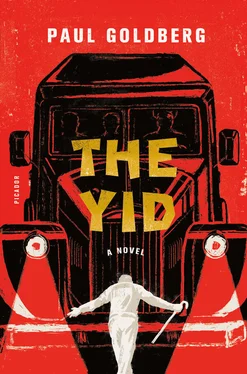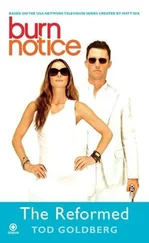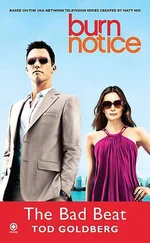Five burst into his room, in robes of harsh red.
“What are you, doctors?” asks Stalin in his skull, but they don’t seem to be the same as that preposterous Yefim. They fail to answer.
Perhaps addressing them requires speech. He glances at the clock: 4:34 a.m.
“What are you, doctors?”
“Judges,” a tall specter says.
His is armed, it seems. He is holding a curved sword. The old man saw that sword before. Was it not brandished by Yefim?
“Defendant, state your name.”
He feels a hand — a corporeal hand — grab hold of his shirt collar and lift him up. A specter with a hand that grips is something new: a threat.
“Iosif Stalin. Who are you?”
The judges suddenly line up ominously like a firing squad. “Am I awake? Can this be real?” he thinks.
“Mikhoels, Solomon,” says the tall judge, the one who propped him up, and held him by the collar.
“Kaplan, Arkashka,” another specter says.
“Zeitlin, Yefim,” says specter number three.
“Akhmatova, Anna,” says the fourth.
“Robeson, Paul,” the fifth one says.
What is this? Some alive. Some dead. All known to him but one: Kaplan, or some such. Has the world changed? And this Yefim, again. The old man needs to adjust to the changing boundaries of his new life.
“Paul Robeson?” asks Stalin out loud.
“You lied, and I believed,” the specter answers.
“You wanted to believe, and so you did.”
“We sinned together.”
When did they lose their ability to hear thoughts? When did they learn to speak? Are the children different now, too? Will they still dance and play the way they did last night?
Mikhoels, who is clearly dead, and thus a harmless specter, has to differ from that Robeson fool.
“Mikhoels, do you think I missed the insult in your Kinig Lir ? You called me a fool for liquidating your old friends. I banished Trotsky. Is he Kent? Cordelia Bukharin? Let’s cast Zinoviev, Kamenev, Yagoda. Which one’s your Edgar? Which one’s Edmund? I am not Lir! I kept my kingdom! I’ll make it bigger still, uniting Earth and hell to build a heaven.”
“I know why you had me killed. I grew too big for you to handle,” the tall one says. “But why kill Zuskin?”
“I read your article about Lir. You said so yourself: Lir and his jester are a single role. You taught me that the king’s the fool, and the fool’s the king. Agreeing, I decreed that the fool must follow his king to his new kingdom. Not me — the real Sovereign — but you, Mikhoels, the pretender. You left me no choice. You wrote the play. My job was to enact it.”
Levinson’s stage directions read:
Chief Judge begins a nign.
The melody is as simple as melodies can be. No words, just winding, wailing sounds, which souls carry into the heavens and back.
Ay-yay-yay-yay-yay-yay-yay-yay-yay
om bibibom-bom bibibibibom
ay biri-biri-bim-bom, biri-bim-bom
ay digidamdam-digidamdam, om-bibibibom-bibibibom …
* * *
“Yefim, I saw you minutes ago. You raised a sword. Was that a warning or a threat?”
“A mortal threat.”
“The day I fear the likes of you will be the day I die. I do not fear, so I live.”
“You lost your grip tonight,” the tall judge says.
“ You lost your grip, not I. Here’s all one needs to know about Jews. You kill each other for a cause, and I control the cause and give you weapons. Then I sit down and watch. One couldn’t wish for a better sport. You mocked your God, you mocked each other’s deaths and threw the corpses to the wolves. This wasn’t symbolism. The wolves are fat. It’s real.
“Where is my fault, Yefim? Your people wanted me, and I was there.”
The nign continues, and its sound makes Kima touch Yefim, her father, like on those happy nights, when she slept in her crib, and he secured the foundation of their bright future. The contact of their souls produces hot tears that come from sadness and from joy.
Ay-ay biri-biri-biri-bim-bom
ay-ay biri-biri-biri-bom
biri-biri-biri-biri-bom …
* * *
Tears don’t cripple her. Her strength increases tenfold. Her hand is steady and her weapon poised.
The sun has yet to rise, and purring has begun.
The children slide off the illustrations and stand along the walls.
“I lived for you,” says Stalin to them. This time, he uses his voice.
They look indifferent, detached.
“Our kinig is addressing specters on the walls,” notes Kogan. “He is as mad as he is lucid.”
Levinson’s stage directions: The Chief Judge prepares physical evidence.
“Let’s kill and flee,” says Kima.
Orphans have no patience for ritual of any sort.
OL’GA FYODOROVNA: How can we kill a man who may not understand why he is being killed?
LEVINSON: Why does it matter?
KOGAN: From the standpoint of ethics, Ol’ga Fyodorovna isn’t wrong. I am starting to wonder about this myself.
LEVINSON (reaching inside his rucksack to produce a janitor’s bucket) : Ethics? What do you think we are?
LEWIS: Assassins.
OL’GA FYODOROVNA: Not I.
LEVINSON: Not you? Pray tell, what brings you here?
OL’GA FYODOROVNA: Pursuit of dignity.
LEVINSON: You’ve taken a wrong turn.
KOGAN: Indeed, my dear, assassinations are not especially dignified events. This is my first, of course, so I am only guessing.
LEVINSON: Enough! Please, Kogan, read your lines! I do not care what he understands. I care even less about her dignity and her pursuits!
OL’GA FYODOROVNA: How petty …
LEVINSON: Not those pursuits. He’s dead, besides. Please … sha! Somebody, read your lines!
KOGAN (reading) : For you, Reb Iosif, we stage the first Blood Seder history has ever known. We will pretend that God did not stop Abraham’s hand, and human sacrifice flourished.
LEVINSON: We stage this play to make your madness real.
Had Solomon Mikhoels beheld him now, he would have seen his equal. Solomon Levinson is an actor who can direct, a director who can write. No wood. No splinters. Not a railroad spike in sight.
Watch Levinson seize the stage with energy, inspiration, movement. He hasn’t felt so young since 1921. On March 1, 1953, Levinson is wiser.
Directions read: The prisoner is inverted.
To hoist a man, you need two acrobats. Have them kneel down, then put one hand on each calf, another on the shoulder, and, yanking fast, stand up. The movement is machine-like.
Imagine this: the room is painted black. Chagall designed your set. There is no set, in fact. No seats, no stage. No right, no left, no up, no down. Let Marc design the costumes, too, and stick a cubist beak upon your schnoz. Make all the pieces click, biomechanically, machine-like, a modern unit fused in action.
The czar lurches forward, then to the side, but that is all — for even in his prime, his strength was meager.
Lewis and Kima grab a calf each. Each grabs a shoulder, too. Two acrobats invert the tyrant, as justice triumphs. Vault! The great biomechanical Machine of Truth is blasting off the dust and cobwebs.
Moscow time is 4:42 a.m.
The wheels of just revenge begin to grind.
* * *
When you are a little man with a crooked arm, you learn to protect your space. The arm is no problem. It petrifies, turns into granite, hard as a statue, which would be fitting, except the fingers curl. If you can part them with your right hand, a cigarette can be inserted. Or part them further and fold in a pipe. The left arm is decoration. The right arm is what you need when you make speeches.
The elbow moves forward, then back again, but not the arm. It hangs at an obtuse angle. And pain is close, lurking in the left shoulder.
Читать дальше












